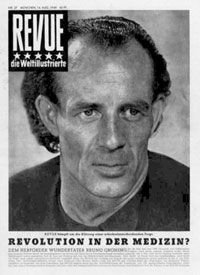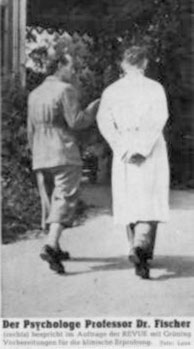A REVOLUTION IN MEDICINE?
"Revue", 14.8.1949 Clarification of a fateful question
 The future activity of the Herford miracle man Bruno Gröning, who, according to eyewitness testimony, healed thousands of hopelessly ill people in May and June, 1949, has been made impossible through the intolerance of physicians and officials in northern Germany. On May 3, 1949, Gröning was forbidden to further pursue his healing activity. Since June 29, Gröning has withdrawn from the public eye. But Bruno Gröning has not disappeared; nor is the question of his wonderful healing power settled. For the Revue (a magazine) has opened the way for Gröning to participate in a large medical clinical trial, where he can prove his healing power to critical, but unprejudiced physicians. Thus, the Revue gave Gröning the chance to prove to modern scientists, "I heal the incurable." Today, the Revue begins by publishing the findings of 150 indisputable experiments. Read what our correspondents Bongartz and Laux report in the Revue, under the scientific direction of the psychologist and physician, Prof. Dr. Fischer.
The future activity of the Herford miracle man Bruno Gröning, who, according to eyewitness testimony, healed thousands of hopelessly ill people in May and June, 1949, has been made impossible through the intolerance of physicians and officials in northern Germany. On May 3, 1949, Gröning was forbidden to further pursue his healing activity. Since June 29, Gröning has withdrawn from the public eye. But Bruno Gröning has not disappeared; nor is the question of his wonderful healing power settled. For the Revue (a magazine) has opened the way for Gröning to participate in a large medical clinical trial, where he can prove his healing power to critical, but unprejudiced physicians. Thus, the Revue gave Gröning the chance to prove to modern scientists, "I heal the incurable." Today, the Revue begins by publishing the findings of 150 indisputable experiments. Read what our correspondents Bongartz and Laux report in the Revue, under the scientific direction of the psychologist and physician, Prof. Dr. Fischer.
THE PLAN OF THE REVUE
Today, the Revue begins a publication, whose subject matter goes far beyond the purely journalistic. Its focal point is a man who, though simple, has risen to fame in but a few months: Bruno Gröning who, in Herford and other cities, has healed or improved in a wonderful, mysterious way the ailments of thousands of sick people, who had been considered incurable. No politician, no economist, and no artist has moved people in the post-war years as Bruno Gröning has done. Other countries as well, even England and America, have been stirred by the spread of his fame and the sensational press reports that have alternated between praise, skepticism and arrogant rejection. The derisive contempt fed on sensation, uncontrolled rumors and contradictory statements. Almost everywhere there has been a lack of the necessary seriousness, responsibility, impartiality and knowledge of the significance of the problem that Bruno Gröning has brought overnight to public attention from the narrow realm of medical disputes.
The medical collaborators of the Revue have already long concerned themselves with the question of the emotional causes of most illnesses, and have been studying the development of relevant research in the non-German world, which often goes unnoticed in Germany. In the case of Gröning, it is a matter not only of the person of the miracle doctor, but of the significant question of the psychological, i.e., mental causes of illness and of the consideration of these causes in the psychotherapeutic treatment of patients. Gröning may be a phenomenon in the area of the treatment of mentally-caused illnesses. Therefore, as the campaign around Gröning in northern Germany took on a more and more chaotic form - on some days, as many as 6,000 people gathered in front of his place of activity - the Revue came to what is an unusual decision for a magazine.
The conflict between Gröning's countless followers and his few, but influential, opponents had meanwhile increased to an intolerable extent. A medical commission and the Herford officials issued Gröning a prohibition to heal. In Herford, Hamburg and many other cities, however, thousands of sick people continued waiting for the miracle man’s help. Finally, the official authorities were seized by a great helplessness in the face of the Gröning phenomenon, so that one had to fear an unhappy end to this phenomenon itself. Would Gröning be worn out between the power of the opponents and the power of the believers? Would the simple, intellectually clumsy man Gröning - who is, however, filled with a genuine sense of mission and honest readiness to help - perish because of ‘supporters’ who sidled up to him to cash in on his healing power and thus exposed him to his opponents in numerous cases? Or would a medical or other scientific institute in Germany - out of an honest desire to do research - agree to give Bruno Gröning the opportunity to clinically verify his abilities? Any larger clinic in the USA today would readily agree to this. After fruitless discussions, it was to be feared at the end of June that Gröning would be worn out. The question as to whether he would be acknowledged as having a wonderful, salutary ability to influence others spiritually, or whether it would be certified that his alleged abilities were a mistake - even charlatanism - remained unanswered for millions of suffering people.
At this point in time, the Revue decided to send a special staff of correspondents to northern Germany, consisting of Helmut Laux, Heinz Bongartz and a scientist, the Marburg psychologist and physician Prof. H.G. Fischer. The staff were supposed to locate Gröning, whose tracks were already starting to blur. They were supposed to carefully examine a large number of cases treated by Gröning and give a convincing account of the success or failure of his healings. In the case of a positive outcome of this preliminary examination, the Revue staff were supposed to form an impression of the circumstances surrounding Gröning and of the person of Gröning himself. Depending on the results of these investigations, the staff had the assignment and the means to separate Gröning from the possibly unfavorable influence of his environment and pave the way for him to escape the smothering chaos among believers, physicians and bureaucratic authorities. After obtaining his approval, Gröning would be provided asylum in an unknown, secluded place. At the same time, the Revue staff - in the case of a favorable outcome of the preliminary examinations - would make preparations to win the cooperation of a leading German university clinic. It would give Gröning the opportunity to prove his abilities in the presence of a committee of scientists. In the case of failure, a clear, incontestable report would inform the public of the negative result. This was the Revue’s plan.
Its realization began on June 28, 1949. It brought with it difficulties, adventure and surprises. But the plan succeeded, without the public being able to find out about it - to assure its success - until today. For them, Gröning had disappeared on June 29, 1949 at 11:45 PM in Hamburg. Today, the Revue begins with the in-depth report of the correspondents and the leading physicians on the prehistory and history of the greatest and most astonishing medical experiment that was ever made possible with the help of a magazine.
Bruno Gröning: the phenomenon of a doctor of the soul
By Helmut Laux and Heinz Bongartz, under the scientific direction of psychologist Professor Fischer
On the tracks of Bruno Gröning
The attitude of the doctors
We left Frankfurt on June 29, the very same day that Gröning disappeared from Hamburg without a trace. We journalists were naturally curious, and, although he was reserved, Professor Fischer couldn't completely hide his curiosity. But he was determined to approach the Gröning case systematically and to form a judgment slowly and conscientiously. Our collaboration with Professor Fischer was excellent from the very first day. He had gone through the usual medical education. As a traditional physician, he was in a position to assess cases of illness and to judge whether they had deteriorated or been healed. On the other hand, he was a psychologist and practiced with the help of psychoanalysis (analysis of the mind) and psychotherapy (therapy of the mind). If it did actually prove to be effective, however, Gröning's method would have to be categorized as therapy of the mind – unless Gröning had other powers at his disposal that are still unknown to psychotherapy today.

On behalf of the Revue the psychologist Professor Dr. Fischer (on the right) discusses the preparations of the clinical tests with Gröning.
We arrived in Bielefeld on the evening of June 29, and since Professor Fischer coincidentally already knew the director of the healing institutions in Bethel, Professor Schorsch, we went to him first. Professor Schorsch had played an essential role in the medical commission whose decision had contributed to the prohibition against healing for Gröning. At first he didn't want to see us journalists and received only Professor Fischer and told him of the impression he had of Gröning: He is a totally primitive person; above all, he has no "charisma." For those who don't know the word, we should add that the scientists define that as "a sense of mission". Schorsch said that the “sense of mission” that Gröning often spoke of in Herford and elsewhere is "pure dramatics". It is much more a matter of egoism and arrogance. As proof of what he said, Schorsch showed us a written expert opinion that stated the same. Professor Fischer took notice of his judgment. By the way, Professor Schorsch did not give the impression of conscious prejudice. He seemed somewhat uninterested. He was plump and pleasant, and it seemed as though he would prefer to hear nothing more of the Gröning case. He probably did not like to plunge into emotional excitement and wanted to have no further inconvenience. He said we shouldn't depend on his judgment, but should dig into the case for ourselves.
Prof. Dr. Wolf, the head physician of the city healing institutions in Bielefeld, was more open. He definitely appeared to share our opinion that the Gröning case had to be checked out without reservation. He pointed out, however, that it was well known that they had offered Gröning the opportunity to prove his ability in clinics. What should he think of the fact that Gröning rejected this offer? Could one blame the physicians if they observed a man with extraordinary skepticism who had refused to demonstrate his abilities to them?
We ourselves naturally also wondered why Gröning had avoided such a clinical observation and appraisal of his treatment methods. Did Gröning have reason to doubt Professor Wolf's objectivity? When Professor Fischer arranged a few weeks later for Gröning to practice before the physicians of the Bielefeld city healing institutions, he had to experience that only one intention existed, namely to destroy Gröning; while giving the appearance of being obliging, they brought him only cases that were beyond help, even for Gröning. Professor Fischer therefore had to abstain from allowing Gröning's methods to be appraised by the Bielefeld physicians.
Further, it was said that the Detmolder public medical officer, Dr. Dyes, had told Gröning that it didn't matter how much proof of his healing ability he furnished, they would prevent his work anyway! Therefore, Professor Fischer called Dr. Dyes by telephone from Herford and asked him about this, and Dr. Dyes made no bones about his statement. Gröning had made a bad impression on him. Dr. Dyes was full of medical arrogance, and extraordinarily satisfied with his own position.
In this way, Gröning was to lose all faith that the physicians would have an objective attitude, so one cannot blame him for not accepting the offer of hospital experiments. The natural, simple man’s instincts had sensed the unfair intentions that lay in wait for him.








